Hello, Hivers!
It's been a while since I posted. Though I want to make another travel post, I've been exhausted with freelance work these past few days so I'm feeling like talking about personal development this time.
Every month, I see to it that I read at least 1 book. Since I shared the Optimist Creed in my intro post, I was excited that my friend @thegaillery was inspired by it as I was! I read it every night after I write in my journal. She reads it every morning to start her day. It feels nice to spread the positivity around.
Hence, I figured I should share with you the things that I've read in my Book of the Month. For July, it will be "Atomic Habits" by James Clear. My objective is to inspire even just a single soul who reads it the same way as to how the book inspired me to strive to be the best version of myself.
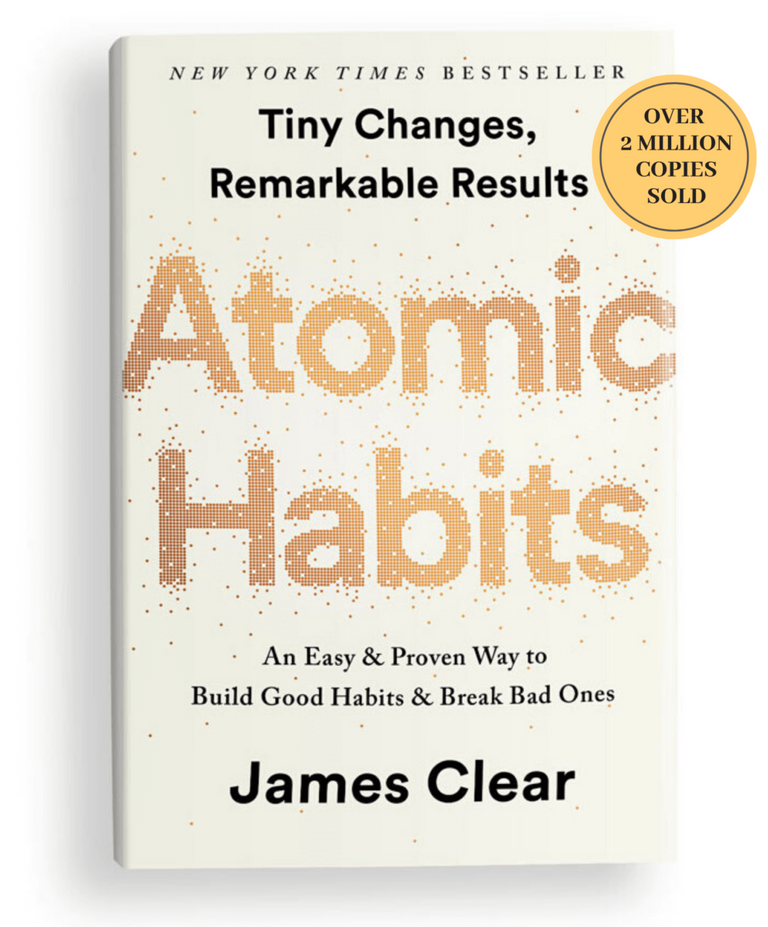
In his book, James Clear says that success, however we define it, is achieved through tiny positive acts that are reinforced with consistency over time into atomic habits.
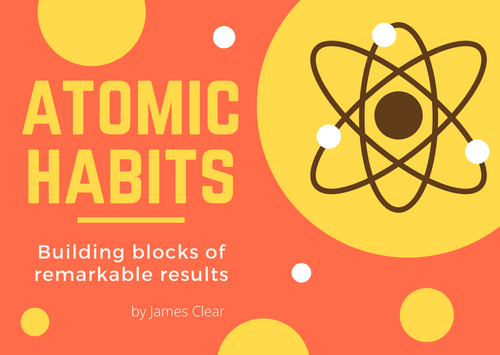
Focus on systems, not progress
Goals are for setting a direction, but systems are best for making progress.
Do you ever feel like no matter how hard you try your best, you're not making a lot of progress? Do you jump to the conclusion that you're a lazy, weak-minded person just because you did not reach your goal?
Let us treat our goals as a compass. Let's not think that there's only one way towards it. What works for others may not necessarily work for us. For example, I heard that calorie counting helps in slimming down. After trying it out and not seeing any progress, I learned not to assume right away that I will never lose weight. I mean, what's the alternative, just accept it and eat whatever I want and gain even more weight? 😅Instead, I tried other systems such as fasting and HIIT exercise.
Let's experiment with our systems and be creative. It doesn't always have to be perfect. Expect constant tweaking using the techniques I'll present next as a guide.
Here are 13 Techniques to Build our Atomic Habits:
Disclaimer: The principles of these techniques are all credited to James Clear, including the quoted statements gathered from his book verbatim. I just included my insights and cited examples that are relatable to my own endeavors of self-improvement.#1 Pointing-and-Calling System
The process of behavior change always starts with awareness.
This system aims to point out and call our nonconscious habits to a more conscious one. When we are level-headed, we know exactly what we should and should not do. But when emotions begin to stir, we forget the rules.
With this system, we acknowledge that we mess up without judgment. Why did you check your phone despite distancing from distractions? What emotions were you trying to appease by doing that action? Perhaps it was anxiety. What are better ways to deal with anxiety?
We get to reassess our actions. Will this decision be made by someone who I want to become?
#2 Implementation Manifestation
Many people think they lack motivation when what they really lack is clarity
I will eat healthy foods.
I will be more productive.
I want to earn more money.
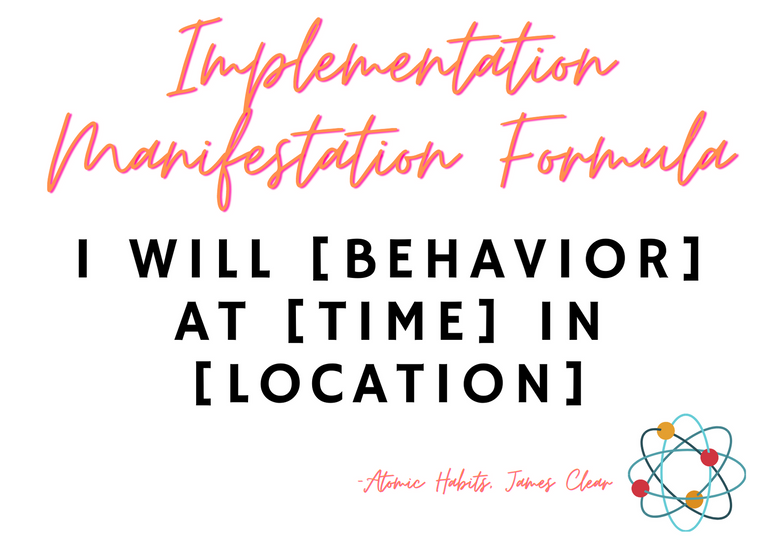
I will eat an apple and an orange every lunchtime at work.
I will write 500 words at 7 PM in my study area.
I will message prospective clients on Facebook every 8 PM.
#3 Habit Stacking
It's like you always have a game plan for which action should come next
This is like a spin-off of #3's Implementation Manifestation. The formula is:
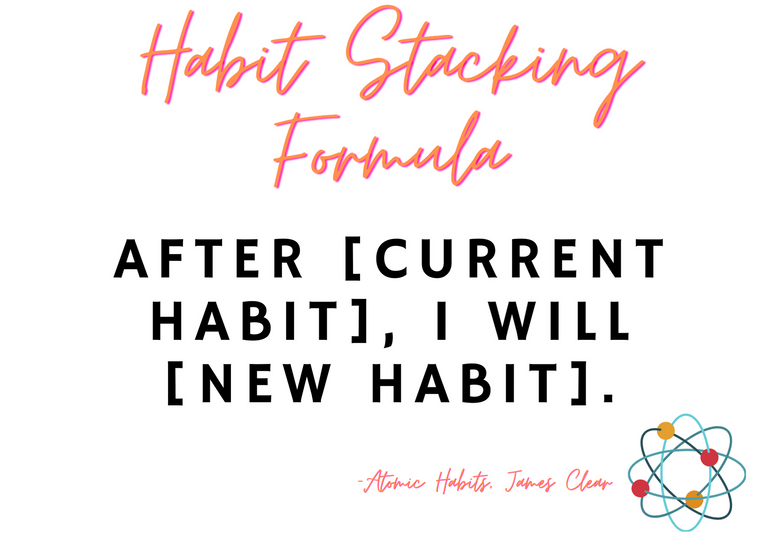
After I finish my shower, I will pack my apple and orange for my work's lunch.
After I finish my dinner, I will write 500 words in my study area.
After I open Facebook, I will find and message prospective clients.
The trick is to choose something we always do as a [Current Habit], so we have no choice but to follow with the [New Habit].
#4 Design your Environment for Success
Motivation is overrated; Environment often matters more
We can't just rely solely on motivation. Why test and exhaust ourselves when we can make things easier by designing our environment for success?
You want to start going to the gym? Enroll a 1-year membership program to a gym along the way to work.
You want to sleep early, move out the television from your room and place your mobile phone out of your reach.
#5 Join a tribe
Surround yourself with people who have the habits you want to have yourself. You'll rise together."
Find a support group. You want to learn sales? Join a networking group and observe the top salespeople.
The ugly truth is, our support group does not always have to include our family and close friends. Although it may be hard, let's not take it personally. This is not about us, they may have their self-limiting thoughts that they extend onto us.
Surprisingly, there are strangers out there who are on the same journey as we do. They know how hard the journey is and will be, but it's comforting to know that we are not alone.
#6 Two-Minute Rule
When you start a new habit, it should take less than two minutes to do
Beats our favorite pastime--procrastination--, right? 😅
It's always exciting to set ambitious goals for success. I don't take it so much to heart. I just like the challenge and discovering how I prove myself wrong with my self-limiting beliefs. But, when we've got so many big things going on, we get overwhelmed. I've read somewhere that overwhelmed people do not make progress. Well, not with the Two-Minute Rule no more!
You want to go to the gym? Start with tying your shoes, or choosing your outfit, or packing your gym bag.
You want to write and publish a book? Start by writing one sentence or a paragraph.
The point is, we've got to master the discipline of showing up. The two-minute acts may sound boring and far-fetched from our ambitions. But we got to start somewhere. Baby steps.
#7 Habit Shaping
Do the easy thing on a more consistent basis. You have to standardize before you can optimize.
This technique could be combined with the Two-Minute Rule. Whereas the two-minute rule pushes you to jumpstart your habits, Habit Shaping helps you create a roadmap to your dreams.
Much like project management, divide your goals into different phases. Finish the easier parts before moving on to the next phase.
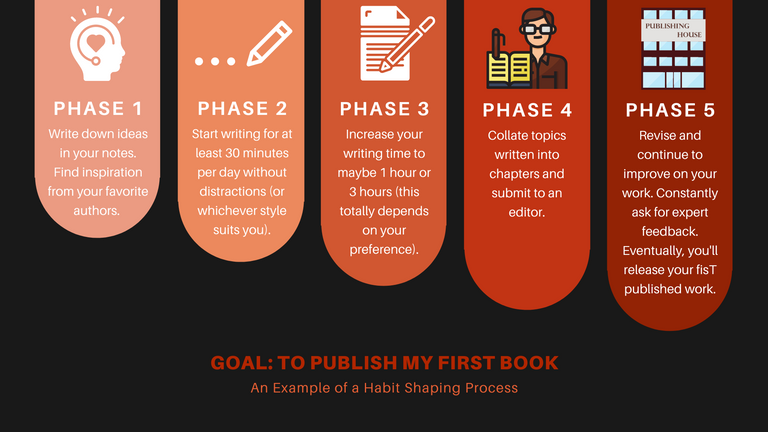
Reaching our goals is like running a marathon. Don't exhaust yourself right at the start by sprinting. Take your time and build up your momentum.
#8 Commitment Devices
A commitment device is a choice you make in the present that locks in better behavior in the future.
I remembered a commercial for a chocolate bar where the guy turned into another person when he was hungry. But when given the chocolate bar, he turns back to himself. Tagline: You're not you when you're hungry.
Similarly, we become someone else when we are emotional. Usually, I can't commit to my fasting regimen if I rely on my brain to remember the last time I put food into my mouth. My brain short circuits when I see food. That's why I decided to upgrade my system by downloading a fasting app. As long as my alarm does not go off, it's a no-eating zone. In this case, my commitment device was the fasting app.
The best purpose of a commitment device is to help you automate your habits.
#9 Immediate Rewards
What is rewarded is repeated. What is punished is avoided.
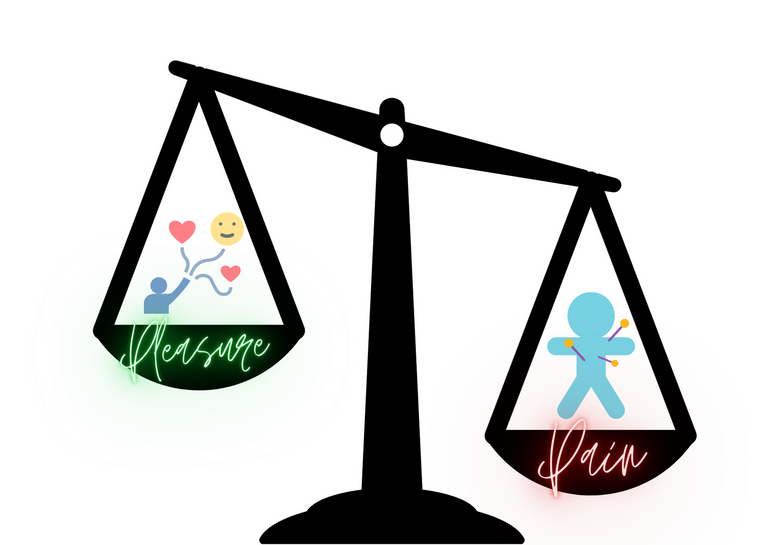
This concept morphed with the things I've learned in my Book of June: Awaken The Giant Within. Tony Robbins' said there are only two things that influence our decisions: pleasure and pain. These are two objects that tip the scale to one side or the other. If we want to pursue something, we can create a notion of pleasure associated with it. If we want to stop a bad habit, associate great pain with it that we would want to stop immediately.
That's why the rewards system is I think, effective. When we achieve small wins, let us reward ourselves. We create a pleasurable incentive by pushing ourselves to work hard.
#10 Habit Tracker
Habit tracking provides visual proof that you are casting votes for the type of person you wish to become, which is a delightful form of immediate and intrinsic gratification

#11 Accountability Partner
An accountability partner can create an immediate cost to inaction. We care deeply about what others think of us, and we do not want others to have a lesser opinion of us.
Now, we've got to set boundaries on whose opinions we should listen to. I'm currently reading a book right now that says, if that person also dared greatly in the arena of vulnerability, then you listen to him/her. If not, he/she could mind their own damn business. But this is for the next Book of the Month's session 😂
My point is, let's choose our accountability partners wisely. Choose someone whose best interests are to see you succeed, not point out, and make themselves feel superior about our misgivings. Choose someone who'll critique you that matches your tolerance. The aim is to help someone make your aware that you're starting to get off-track to your goals. And then make you accountable for them.
#12 Goldilocks Rule
Improvement requires a delicate balance. You need to regularly search for challenges that push you to your edge while continuing to make enough progress to stay motivated.
The Goldilocks Rule works with the principle that you will only keep on working on the tasks if it's not too difficult and not too easy.
Too Difficult: When we feel like there's no way we could do it, we shut down. We stop trying. What's the point? We'll just be wasting time and energy.
Too easy: We don't want to feel stagnant and keep doing things like how we always do them. Boredom could make you feel useless and worthless. So, you just stop because again, you're wasting time and energy.
The answer is somewhere in between. If you feel like a task is ambitious and intimidating, break the task down into microtasks. If you feel like the task is not mind-inducing anymore, find the next level of task difficulty.
#13 Habit Review / Integrity Report
Reflection and review offers an ideal time to revisit one of the most important aspects of behavior change: identity.
Every process, if you expect it to get better with time, must be submitted under evaluation. The same is true for our habits.
I also do this at the start of every year as a "ribbon-cutting ceremony" for starting another journal. Even before I've read "Atomic Habits", I've already started this practice at the start of 2020. I start with going over the past year similar to these guide questions:
- What went well this year?
- What didn't go so well this year?
- What did I learn?
Take this as an annual recalibration of our self-improvement journey. The answers to these questions should answer if our actions are still aligned to our values, thus, our integrity report.
Closing Notes
So far, those are the techniques I picked up from the book that I think will provide actionable solutions to practice consistency. I hope this would help you also in building your atomic habits. These things really get me excited 😆
As a closing note, let me just leave you with this quote from the same book that accurately describes what self-improvement is really about:
Progress requires unlearning. Becoming the best version of yourself requires you to continuously edit your beliefs, and to upgrade and expand your identity.
✨END✨

Shared in Twitter:
Love this! Will surely be taking notes of these 😁
Thank you sis for the idea 😘
I love this one
Yeah, me too. The Hive community has been really welcoming and engaging! As a newbie, I'm still learning and taking notes. Hehe.
Congratulations @kayceeports2020! You have completed the following achievement on the Hive blockchain and have been rewarded with new badge(s) :
You can view your badges on your board And compare to others on the Ranking
If you no longer want to receive notifications, reply to this comment with the word
STOPTo support your work, I also upvoted your post!
Do not miss the last post from @hivebuzz: